Off-Page SEO: What Is It, How It Works, Why You NEED It
If you want your site to rank on Google and drive organic traffic to your business, you must consider more than just your on-page SEO strategy.
Now, we understand that search engine optimization (SEO) is well-known for a variety of characteristics, one of the most essential of which is off-page elements. Off-page SEO merely comprises important SEO variables for ranking well in search engines, such as backlinks, and is an important aspect of any digital marketing strategy.
Off-page SEO, on the other hand, may make little sense to folks who are new to Internet marketing. Off-page SEO is a critical component of any effective SEO strategy.
The term "off-page SEO" (sometimes known as "off-site SEO") refers to efforts conducted outside of your website to influence your ranks in search engine results pages (SERPs). Along with on-page SEO, these comprise various basic SEO variables that help a site rank.
Off-page SEO is concerned with everything that does not take place directly on your website. On-page SEO refers to optimising your website and covers things like site structure, content, and speed optimisations. Link building, social media, and local SEO are all examples of off-page SEO. In other words, driving visitors to your website and making your company appear legitimate.
Off-site ranking factor optimisation entails increasing search engine and user perceptions of a site's popularity, relevance, trustworthiness, and authority. Other respected places on the Internet (pages, sites, persons, etc.) link to or promote your website, thus "vouching" for the quality of your content.

Why You Should Consider It
Consider off-page SEO to be the process of increasing the domain authority of your website. Without it, your website may struggle to outrank sites with higher authority.
Backlinks and other off-site signals remain at the heart of Google's algorithm.
In fact, a 2020 search engine ranking factors research discovered a strong relationship between total backlinks and Google rankings.
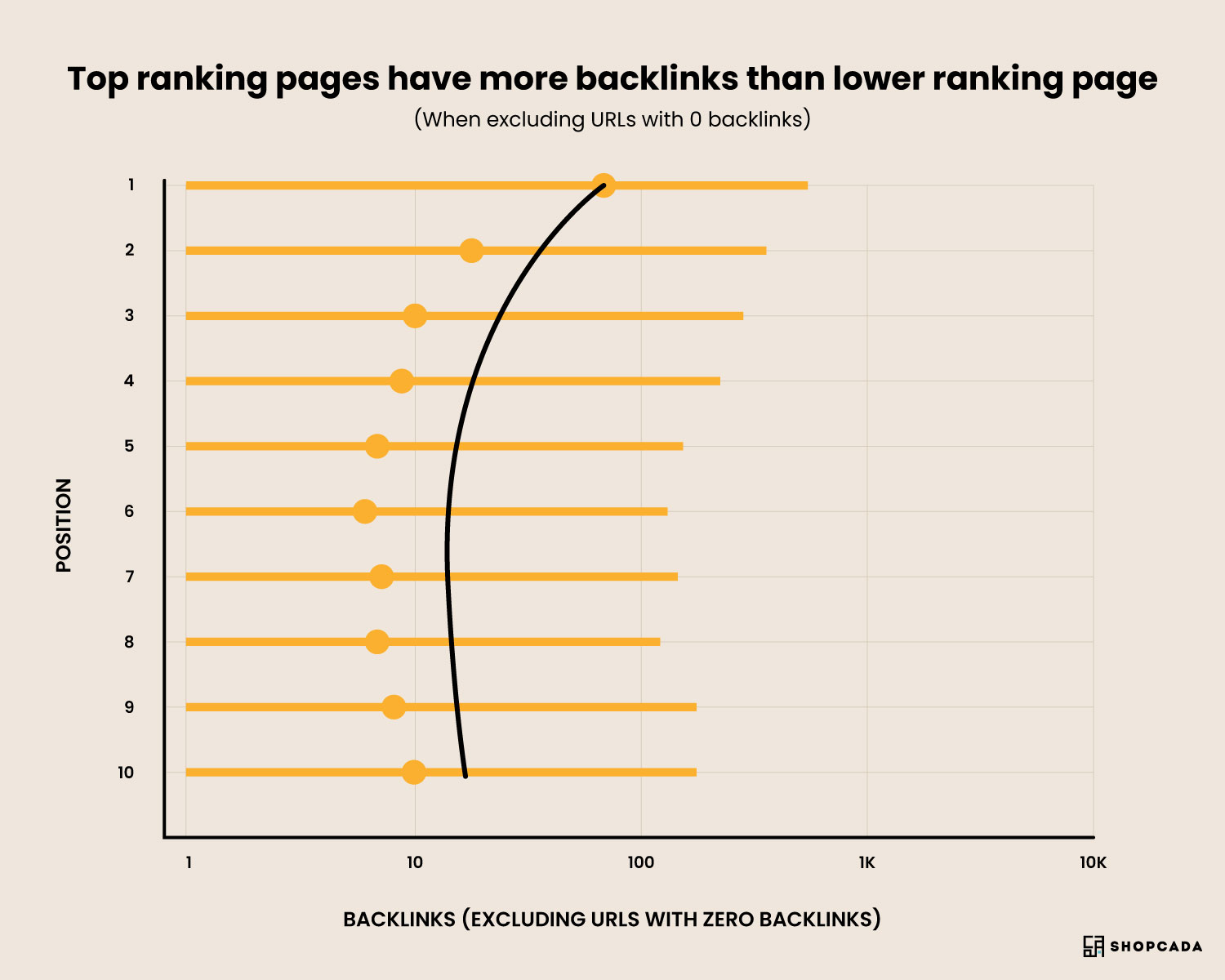
And Google has stated that they continue to employ PageRank.
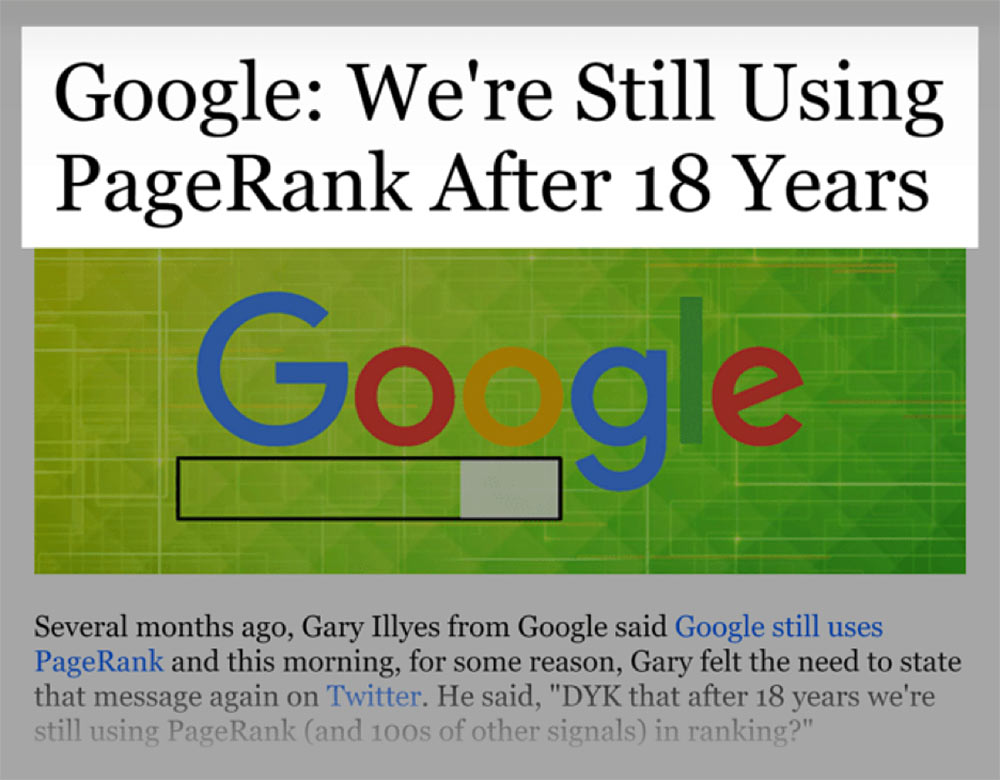
However, links are simply one aspect of off-page SEO. Google states that they employ various off-site SEO signals to evaluate your website.
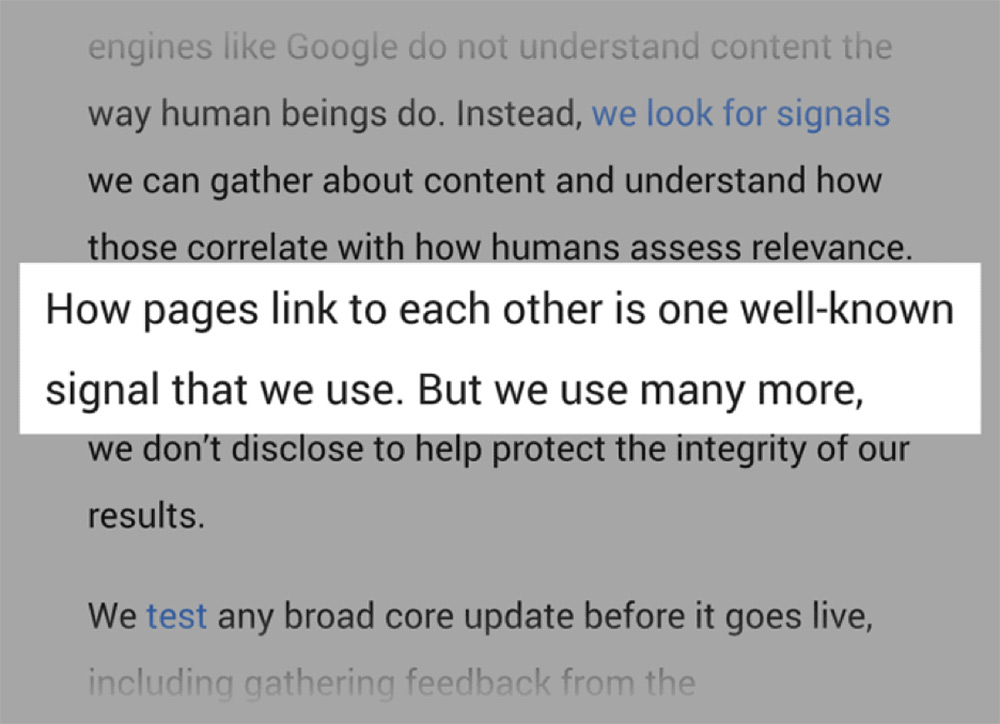
Google's Quality Rater Guidelines, for example, rely heavily on a site's off-site reputation to determine whether or not it can be trusted.
(This is known as "Reputation Research.")
Looking at online reviews is part of "Reputation Research."
Higher authority websites tend to rank higher than lower or no-authority websites because search engines regard them as more reputable, relevant, and trustworthy.
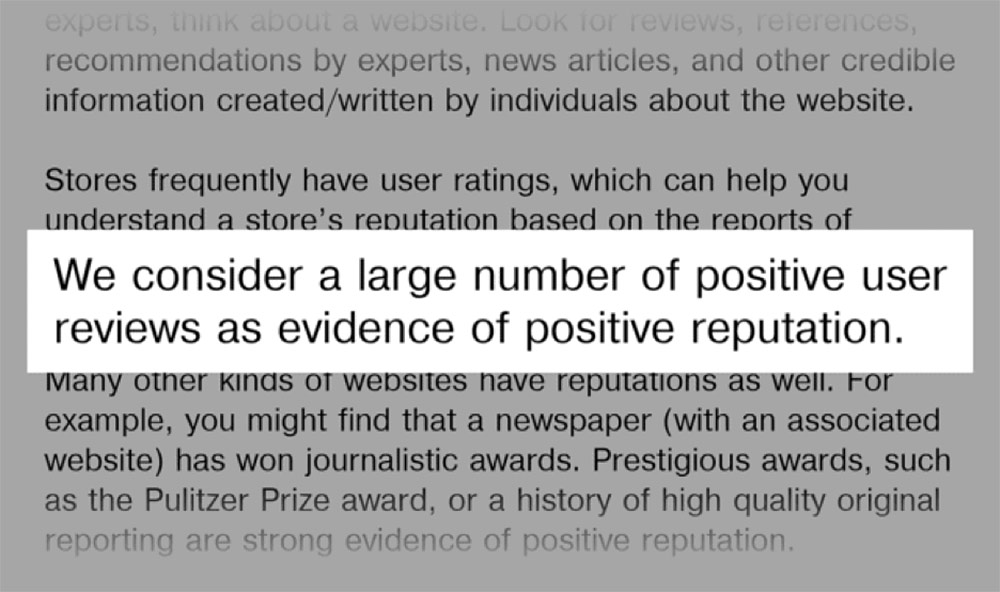
Experts' recommendations:
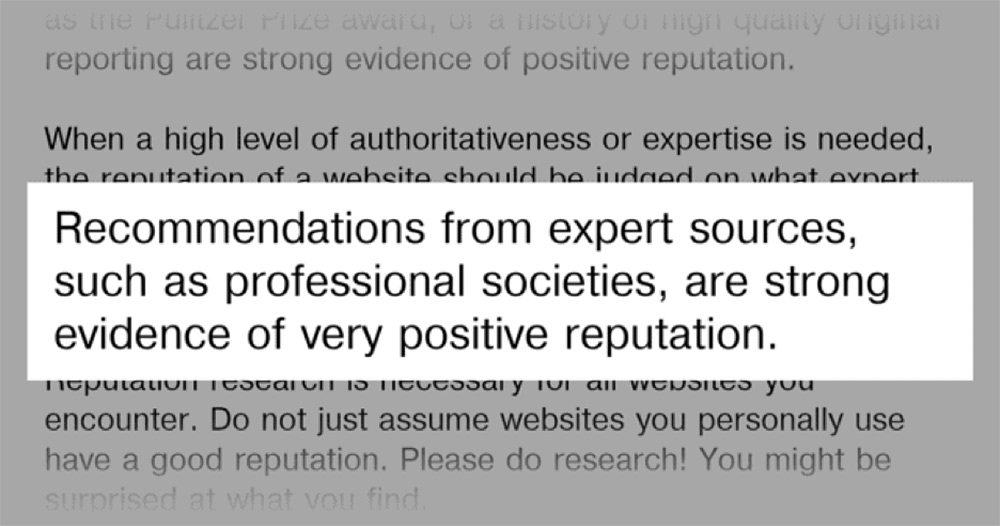
As well as mentions on authoritative news sites and Wikipedia.
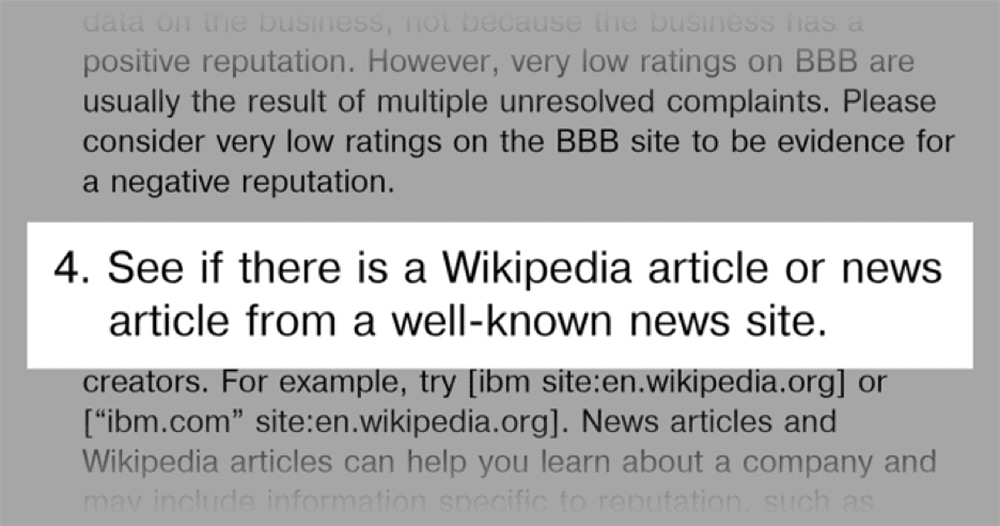
What's the bottom line? By far the most important off-page SEO signal is links. But they are just one among many.
You want to show search engines that many people trust, share, and link to your site. Links are one way to demonstrate this, but you cannot rely just on link creation. There are numerous different off-page SEO tactics you may employ; here are a few examples.
Why Off-Page SEO Matters?
While search algorithms and ranking factors are continually evolving, the SEO industry generally agrees that the relevance, trustworthiness, and authority that excellent off-page SEO provides a website continues to play a significant influence in a page's ability to rank.
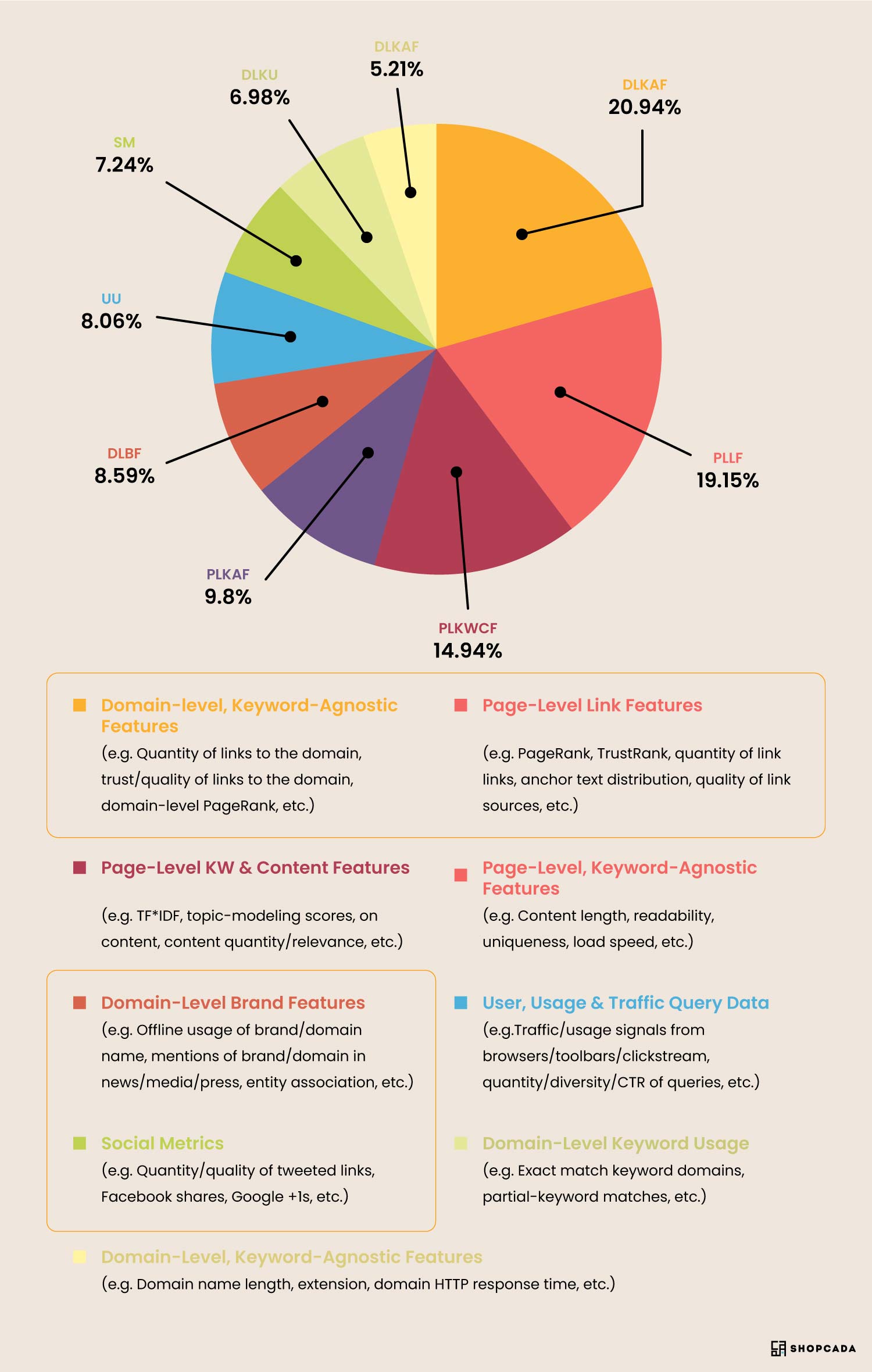
While we don't know the exact algorithm Google uses to rank content, data from our Search Engine Ranking Criteria study indicate that off-site SEO-related factors likely account for more than half of the ranking factor weight.
When you focus on on-page SEO, you are doing all possible to make your site wonderful. You provide excellent content, have a robust site structure, and your mobile site launches in a matter of seconds. Everything is fine in the world. Off-page SEO, on the other hand, assists you in attracting large numbers of visitors and potential buyers. Both are critical components of the puzzle.
You can rank in search engines by generating quality content, but by having a few fantastic, relevant sites to link to that content, you increase your chances of ranking a few spots higher. The same is true for developing your brand and establishing trust. This occurs primarily off-site rather than on your site. Take reviews, for example, which may make or break your business. You require these, although they are usually found on other websites. All of these criteria contribute to your rankings.
It is critical that you not only rank high for your search keyword but also establish trust and authority. You must appear to be the finest search result, not just in terms of technology and content, but also in terms of reality. Everything revolves around popularity, quality, and relevancy.
How?
It all comes down to link building. The glue that holds the web together is links. Links are used by search engines to judge the worth of a piece of information or a website. Obtaining high-quality connections has long been a good strategy for ranking. And who wouldn't be?
Links are an important part of off-page SEO. Before you begin developing or earning backlinks, you must first understand the various types of connections and the elements that determine the value of a link to your website.
However, some people appear to be debating the importance of linkages recently. We are great believers in the value of links. Of course, you need the best. Don't buy anything, and pay attention to where and how you're being linked to.
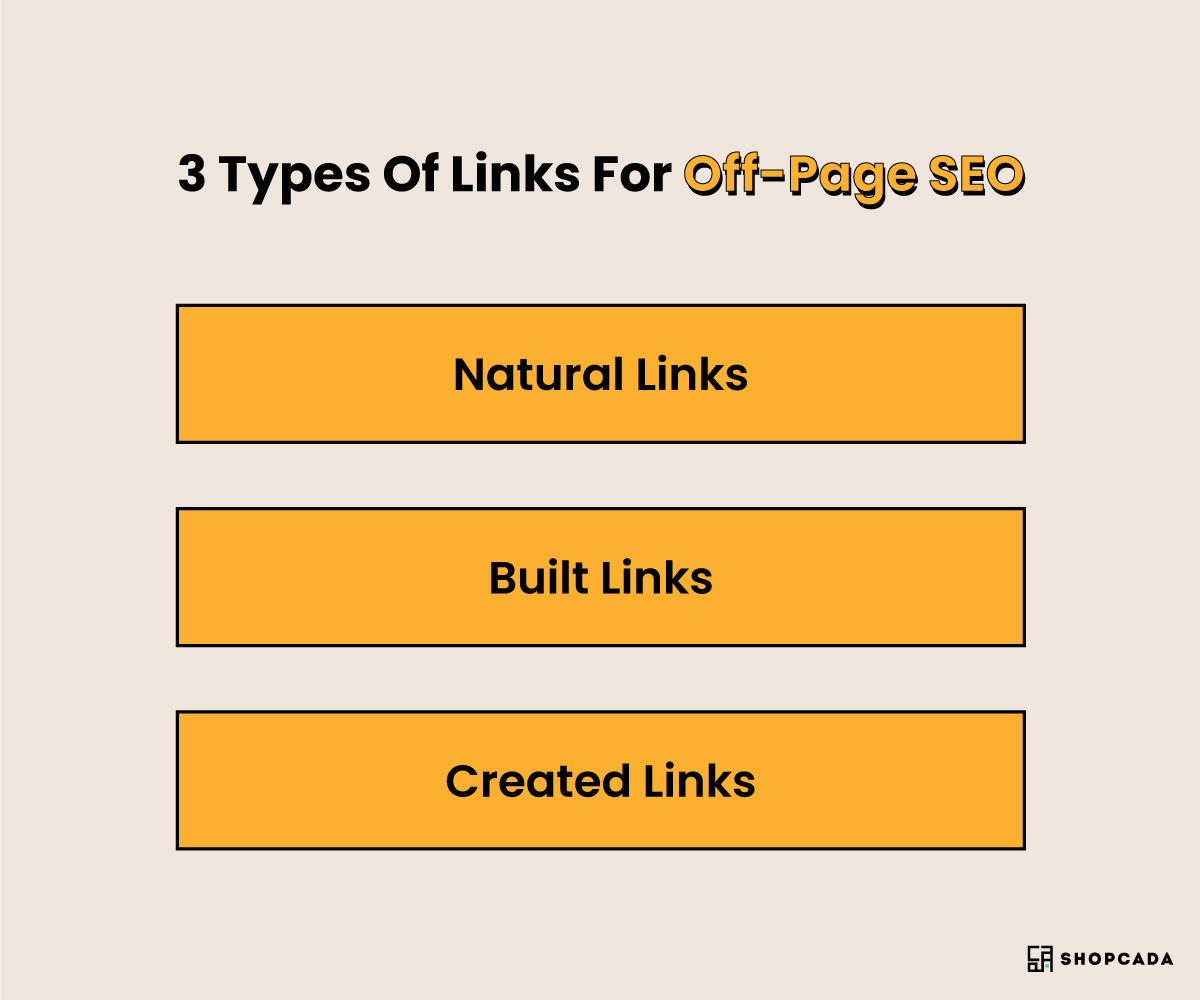
We’ll turn our attention to the three types of links to be included.
Natural Links
A natural link organically leads to your website.
Your team takes no action or conducts any outreach to obtain the connection. The individual authoring that material chose to link to your content, whether they follow your brand or found it through a search.
In any case, they thought your article was valuable and worthy of some form of a note.
Built Links
Outreach results in a built link to your website.
Your team worked hard to obtain this link, whether by contacting webmasters, publishers, or journalists. You may have even pushed the material with an ad campaign, giving it the exposure that allowed people to discover it.
Apart from the fact that you made this link, you still created excellent material for users.
Created Links
Self-submissions to directories, forums, or press releases result in a created link to your website.
Your team purposefully generated this link without undertaking any outreach. Because search engines frown upon this type of link-building approach, this off-page SEO tactic tends to register as a black-hat SEO practice.
Focus on natural or built links when building links.
Off-Site SEO Not Related To Links?
While acquiring links from external websites is the most prevalent off-page SEO approach, nearly any activity that a) takes place outside of your website and b) serves to improve your search ranking position could be considered "off-page SEO." These are some examples:
-
Social media marketing
-
Guest blogging
-
Linked and unlinked brand mentions
-
Influencer marketing
It's crucial to note, however, that the net outcome of each of these activities is the creation of a reference to your site from somewhere else on the internet - whether that reference is a link, a mention of your brand or website, or something else. As a result, the concept of totally "non-link-related" off-page SEO is a bit of a misnomer!

A word on local off-page SEO:
Off-page SEO is dependent on human behaviour (namely, that people only reference and share content they like). As a result, it applies to both organic and local SEO. Even in a physical store, high-quality products generate a lot of word-of-mouth referrals from existing consumers — the in-person counterpart of off-page SEO.
Blogging

Blogging is a fantastic place to start when it comes to creating linkable content for your brand.
Blogs are the only location on the internet where you can find a steady supply of long-form information.
Your audience can comment and share your material on your blog, making it easier to be noticed and begin creating natural links and brand mentions.
And, as you continue to post, you will establish yourself as an industry expert. Your target audience will come to you first for information on the most recent developments and trends, as well as how-to instructions and informative articles.
Talk about building loyalty!
Social Media Marketing
While social network links do not affect rank, they are still among the best venues on the web to increase brand recognition.
Brands with a strong social media presence appear accessible and approachable, which is becoming increasingly crucial for businesses today.
When people can't easily obtain information about a brand, it not only comes across as harsh, but it also calls its reliability into question.
Allow your brand to appear as a pleasant, neighbourhood corner business rather than an aloof organisation.
You may accomplish this by remaining active on social media platforms and launching a blog where you can give your audience a sense of your brand's personality.
Create meaningful and easy-to-read content, and answer warmly and truthfully to comments on both your blog and social network pages. This will make your brand feel more like a bunch of individuals rather than a robot.
Influencer Marketing
How can off-page SEO affect internet opinions?
Many individuals mistakenly believe that creating links is the purpose of off-page SEO because of the emphasis on links as a technique for achieving it.
However, the true purpose of off-page SEO is to improve ranking so that people can find, contact, and purchase from you. Off-page SEO will increase positive brand interaction, whether through links, reviews, social media, or brand mentions.
Off-page SEO, on the other hand, can be challenging because you can't manage those methods without being deemed black hat, and no one wants to wear a black hat.
There is no surer way to undermine your brand's trust — or rank — than to use black-hat SEO tactics such as hiring staff to submit positive reviews or purchasing connections to your site.
And, because you can't control off-page SEO in the same way that you can control on-page parts of your site, it may develop into a stressful waiting game in which all you can do is hope for a positive response from your audience.
If it's unfavourable, you should reconsider your SEO strategy. Examine what is working and make changes to what isn't.
One method for dealing with poor reviews is to:
Implement modifications that will address the legitimate issues expressed in the poor evaluations and after a purchase, contact your consumers and ask for a review.
Contacting internet influencers will also help as having a well-known person support your brand will improve your audience's trust like nothing else.
Guest Blogging

Writing for external magazines is an excellent opportunity to demonstrate your expertise in your field while simultaneously marketing your own company's services. This type of publicity increases your chances of getting clients who might not have heard of you otherwise. Furthermore, it can provide you with a writing portfolio that you can exhibit to other magazines to begin writing for them, and so on.
Social Bookmarking
The process of posting your work to sites such as StumbleUpon, Tumblr, Reddit, and others is known as social bookmarking. These websites separate their material to appeal to various niches, which you may utilise to target buyers in specific demographics. However, before submitting any content, make sure to understand the readership and guidelines of each site.
You don't want to spam these groups. Instead, you want to provide genuine value with your content.
Factors Influencing Link Value
You should also consider the equity or value and authority passed by a link.
While you may receive dozens of low-quality links from spammy or untrustworthy websites, they will not help your company rank well in search results. That is why it is critical to concentrate your off-page SEO link development efforts on reputable domains with high link equity.
The following are the six criteria that determine the equity conveyed by a link:
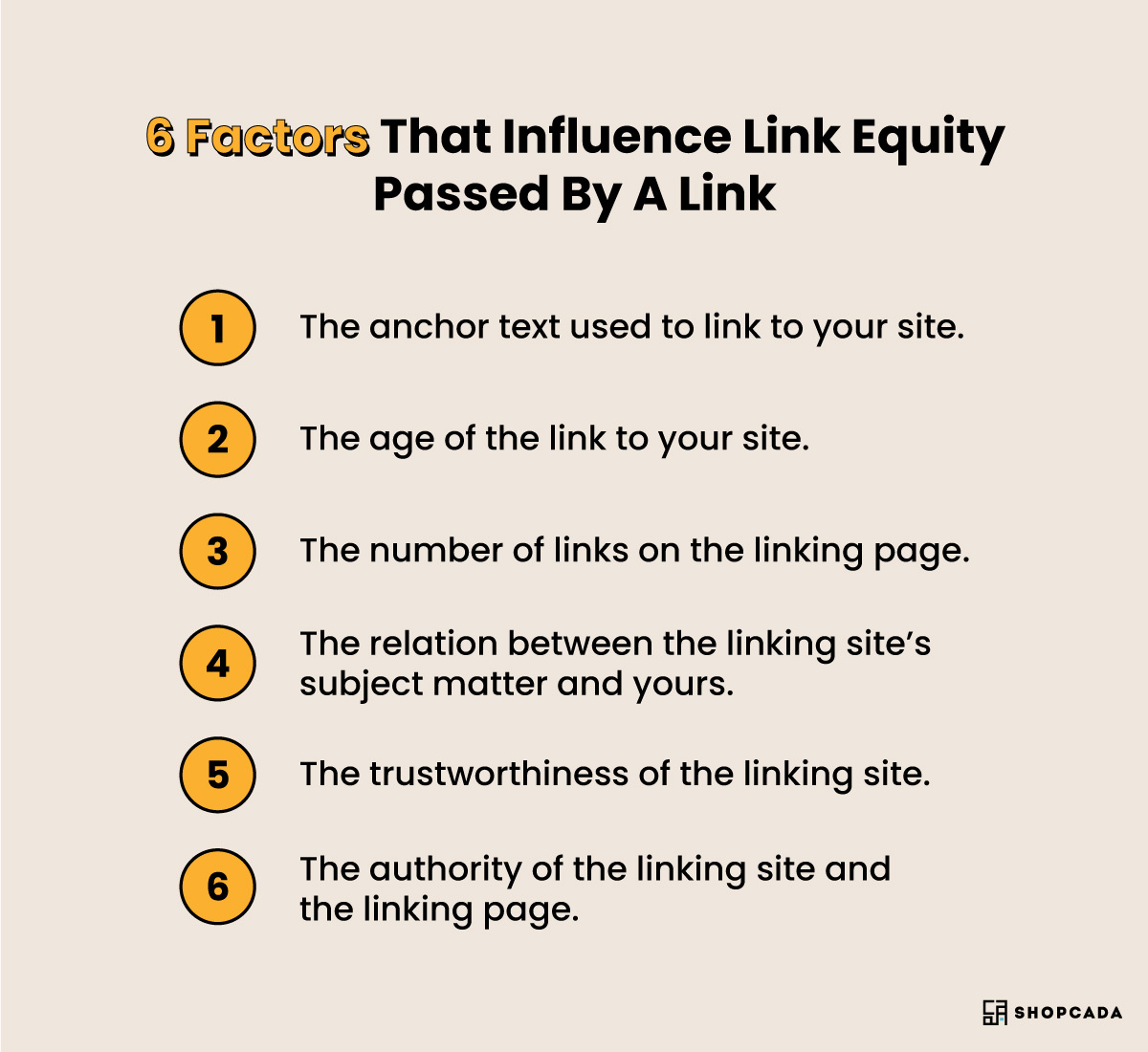
You may examine a site's prospective link value using tools such as Ahrefs, SEMrush, and others.
Closing Words
Off-page SEO, as demonstrated, supplements on-page SEO. Both are intertwined. To get the most out of your SEO, you should prioritise link building, branding, and aesthetics. You can optimise your site all you want, but if consumers don't see it as a quality destination, you won't fare well.
Enhancing a website's "off-page SEO" entails improving search engine and user impressions of a site's quality. This is accomplished by obtaining links from other websites (particularly those that are reputable and trustworthy in their own right), mentions of your brand, sharing of your content, and "votes of confidence" from sources other than your own.
Simply stated, off-page SEO cannot be ignored these days, but it is critical to know that it is about much more than link development.
Off-page SEO has evolved from a primary focus on driving signals that influence ranking criteria to a primary focus on optimising, developing content, and ranking on search engines other than Google.
Think about your brand first, and your off-page SEO will have a lot better chance of making a significant difference in your brand's online presence.

